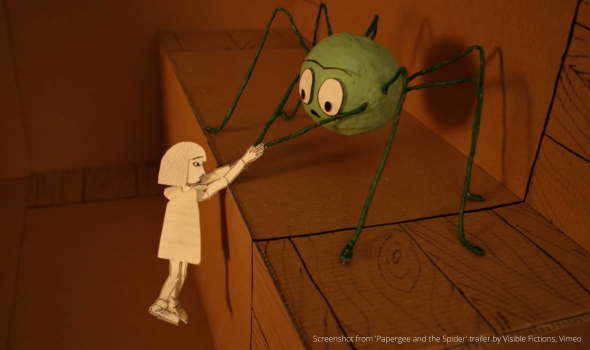Learning about filmmaking at a Glasgow Media Lab
Learning about filmmaking at a Glasgow Media Lab

At Migrant Voice, we’re dedicated to giving a platform to the voices of people who identify as being from migrant, refugee, or asylum seeker backgrounds. At a recent online session with GMAC Film Little Pictures, we learned about how another organisation is prioritising the voices of under-represented groups - and got some great tips on filmmaking on a micro budget too.
On 8 September, participants from 23 countries – including Belarus, Moldova, Scotland, Spain, Hong Kong, Basque Country, Scotland, South Kurdistan, Syria, Lebanon, Germany, Cyprus, India, and Cameroon – came together on Zoom with Wilma Smith from GMAC Film Little Pictures, MV’s Glasgow Network Community Worker Amparo Fortuny and MV Director Nazek Ramadan.
We first heard from Nazek, discussing ideas for video content to draw attention to the Black History Month – coming up in October – which is particularly relevant in the current political climate worldwide. She explained how our aim as an organisation is to create a series of short films with a clear message of solidarity over the coming weeks. As an organisation we’re also concerned about how the Channel crossings are being represented in the British media. Migrant Voice has been responding to the negative press coverage and the ensuing outpouring of right-wing rhetoric on social media by presenting positive messages of support in interviews with journalists. Ultimately, we believe that this country can and should do better. We need to offer people fleeing persecution both dignity and humanity. And we believe this message needs to be heard across all platforms. At Migrant Voice, we believe migrants make Britain.
The rest of the session was led by Wilma Smith, the manager of GMAC Film Little Pictures. She told us how she’s been obsessed with making films since the age of 13, when she would binge watch movies while her mother was on night shift. After being laughed at by a careers advisor at school when she announced she wanted to be a filmmaker, she became a care assistant but always continued to make films. In fact, she says this experience helped her to have greater empathy and a passion for accessing a greater number of different stories. She then joined GMAC Film, who have been representing and developing filmmakers in Scotland for 38 years, always with a view to being inclusive. She has since founded Little Pictures in association with GMAC Film and Screen Scotland and spoke to us about their upcoming launch and call out for applicants.
Launching on 11 September, Little Pictures seeks to make filmmaking in Scotland more accessible. The Creative Scotland Equality Matters programme identified a lack of diversity within the Scottish filmmaking field, both on and off screen, and Little Pictures is dedicated to changing this. They’re offering six filmmakers £2,000 each to make a 15-minute film – and they’ll offer training, support and mentoring along the way. In order to truly be inclusive, applications are open to anyone who hasn’t been commissioned, even those with little or no experience in filmmaking, and applications can be made in any language.
To inspire us, Wilma Smith took us through some examples of short films and the challenges of filming on a micro budget. ‘Papergee and the Spider’, produced by the theatre company Visible Fictions, was a great example of stop motion animation using simple and inexpensive materials such as cardboard, plastics and paper. It highlighted how a small budget but a lot of creativity can be used to tell a compelling story. We also watched a clip from ‘On The Moon’ by Enlightened Monster Productions. The film involved one actor and one location with a voiceover, and was created during lockdown, showing us how to make the most out of a minimal cast and backdrop using creative problem solving.
The film ‘Let My Body Speak’ by Syrian filmmaker Madonna Adib in association with the BFI made extensive use of extreme close-ups and narration, combined with childhood video footage and images. The viewer is left with a surreal, haunting, claustrophobic feeling as Adib explored her childhood experiences of oppressive gender roles and a lack of bodily autonomy. The film was also an excellent example of how one person can take on many roles within a production, with Adib acting as narrator, director, performer and archivist.
With these examples in mind, we were then taken through some of the main challenges and questions when making films on a micro budget. Is the idea achievable in a 15-minute film? Can it be shot in 3-4 days? Is there minimal use of cast, crew, and locations to make the idea more feasible? Can any special or visual effects be achieved on this budget? And lastly, as we’re currently working in a global pandemic, how can we be creative and flexible to respond to restrictive and changing conditions?
We were thrilled to take part in this Media Lab and are excited about the following sessions where we can explore how to creatively make an impact with our message. Roll on the next one!
Keep your eyes on the GMAC Film website for updates about the Little Pictures project – and on the Migrant Voice website and social media for news about upcoming Media Labs.
Kay Singh is a Migrant Voice volunteer in Glasgow.
TOP IMAGE: Screenshot from 'Papergee and the Spider' trailer by Visible Fictions, Vimeo


